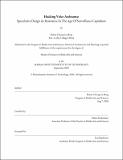Hacking voice assistants : speculative design as resistance in the age of surveillance capitalism
Author(s)
Chong Lu Ming, Rubez.
Download1227784712-MIT.pdf (5.541Mb)
Alternative title
Speculative design as resistance in the age of surveillance capitalism
Other Contributors
Program in Media Arts and Sciences (Massachusetts Institute of Technology)
Advisor
Ethan Zuckerman.
Terms of use
Metadata
Show full item recordAbstract
Surveillance is now ubiquitous. It is used to refer to a set of technologies, a mode of governance, socio-cultural practices, and also, a way of being in the world. This thesis examines surveillance in the context of voice assistants such as Alexa, Google Assistant, and Siri. It investigates the sociotechnical implications of voice surveillance on everyday lived realities. Through the widespread adoption of "smart" technologies, surveillance technologies and its related cultural practices have become normalized. Users consent to, participate in, engage with, navigate, and resist surveillance on a daily basis. Emerging technologies have enabled new modalities of surveillance; from tracking web movement to monitoring physical location to extracting new forms of biometric data. Further, A.I. technologies have turned surveillance into a leaky and fluid exchange of information between governments, corporations, and third parties while giving little visibility to their users. This in/visibility discourse drives and reinforces the power dynamics between the surveillant and the surveilled. My work aims to invert this power hierarchy by empowering makers with the tools for hacking surveillance. HacKIT is a low to high tech civic privacy hardw̲e̲a̲ṟ kit for the redesigning, hacking, and reclaiming of the Amazon Echo, Google Home, and Apple Siri. The voice devices are fitted with 3D printed "wearables" and a sound-generating circuit that obfuscate and confuse speech recognition algorithms. These visual oddities and audio glitches aim to subvert voice surveillance by turning it into a site of hypervisibility. Using speculative design as a form of civic resistance, we make hyper-visible and audible often-discreet voice surveillance operations. Beyond invention, HacKIT is an intervention towards new speculative futures for our relationships with emerging technologies, privacy, and surveillance. It puts an exclamation mark on surveillance and questions the hegemony of surveillance capitalism and its extraction and exploitation of human experiences. Ultimately, it is a mirror for critical reflexivity on normalized surveillance technologies and cultural practices in order to critically-make/create/invent humanity-centered technologies and futures.
Description
Thesis: S.M., Massachusetts Institute of Technology, School of Architecture and Planning, Program in Media Arts and Sciences, September, 2020 Cataloged from student-submitted PDF version of thesis. Includes bibliographical references (pages 90-94).
Date issued
2020Department
Program in Media Arts and Sciences (Massachusetts Institute of Technology)Publisher
Massachusetts Institute of Technology
Keywords
Program in Media Arts and Sciences